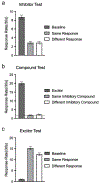Learning to stop responding
- PMID: 36702436
- PMCID: PMC10495103
- DOI: 10.1016/j.beproc.2023.104830
Learning to stop responding
Abstract
Learning to stop responding is an important process that allows behavior to adapt to a changing and variable environment. This article reviews recent research in this laboratory and others that has studied how animals learn to stop responding in operant extinction, punishment, and feature-negative learning. Extinction and punishment are shown to be similar in two fundamental ways. First, the response-suppressing effects of both are highly context-specific. Second, the response-suppressing effects of both can be remarkably response-specific: Inhibition of one response transfers little to other responses. Learning to inhibit the response so specifically may result from the correction of "response error," the difference between the level of responding and what the current reinforcer supports. In contrast, the inhibition of responding that develops in feature-negative learning, where the response is reinforced during one discriminative stimulus (A) but not in a compound of A and stimulus B, is less response-specific: The inhibition of responding by stimulus B transfers and inhibits a second response, especially if the second response has itself been inhibited before. The results thus indicate both response-specific and response-general forms of behavioral inhibition. One possibility is that response-specific inhibition is learned when the circumstances encourage the organism to pay attention to the response-to what it is actually doing-as behavioral suppression is learned.
Keywords: Extinction; Feature-negative learning; Operant behavior; Punishment; Response inhibition.
Copyright © 2023. Published by Elsevier B.V.
Conflict of interest statement
Declaration of Competing Interest The authors declare that they have no known competing financial interests or personal relationships that could have appeared to influence the work reported in this paper.
Figures




References
-
- Baker AG, Steinwald H, & Bouton ME (1991). Contextual conditioning and reinstatement of extinguished instrumental responding. The Quarterly Journal of Experimental Psychology Section B, 43(2), 199–218.
-
- Bolles RC (1972). Reinforcement, expectancy, and learning. Psychological Review, 79(5), 394–409.
-
- Bolles RC, Holtz R, Dunn T, & Hill W (1980). Comparisons of stimulus learning and response learning in a punishment situation. Learning and Motivation, 11, 78–96.
-
- Bonardi C (1989). Inhibitory discriminative control is specific to both the response and the reinforcer. The Quarterly Journal of Experimental Psychology Section B, 41(3), 225–242. - PubMed
Publication types
MeSH terms
Grants and funding
LinkOut - more resources
Full Text Sources

